1961: EL CID Reigns Victorious

The Film: El Cid (1961)
Directed by: Anthony Mann
Starring: Charlton Heston, Sophia Loren
IMDb Plot: The fabled Spanish hero Rodrigo Diaz (a.k.a. El Cid) overcomes a family vendetta and court intrigue to defend Christian Spain against the Moors.
Also In Theaters:
- Bachelor Flat
- If a Man Answers
- Madison Avenue
- Only Two Can Play
- Tender is the Night
- The Three Stooges Meet Hercules
- A View From the Bridge
Also in History:
- January 1st – Hank Pym debuts in Issue #27 of Marvel’s Tales to Astonish.
- January 5th – Tony Sheriden’s My Bonnie, the first album in which the Beatles perform, is released by Polydor in the U.K.
- January 23rd – Jackie Robinson is inducted into the Baseball Hall of Fame.
- February 7th – The United States installs its Cuban trade embargo.
A Time for Heroes
Despite having died 900 years ago, Rodrigo Diaz de Vivar’s story (as told via 1961’s El Cid) somehow feels remarkably relevant to 2017. Sir Rodrigo is subject to Alfonso IV – the corrupt, bronze-faced king of Catholic Spain (which happens to be threatened by an outside, radicalized Islamic army). Alfonso, in his ignorance, projects his paranoia as disgust toward his own Muslim locals – accusing each of being no better than their conniving co-worshippers.
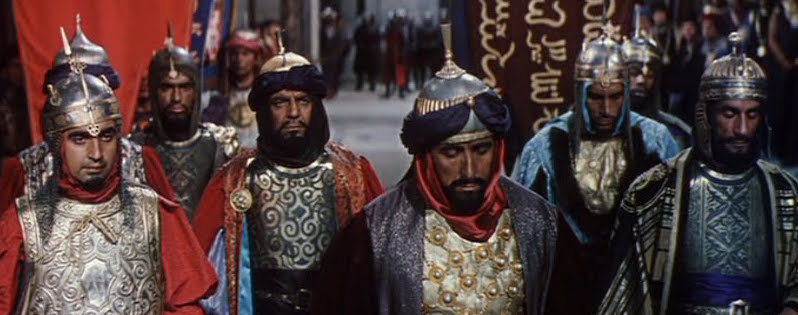
As I write this in December 2016, with Trump’s threat of a registry still ringing in our ears, our bronze-faced King-Elect is still damning his Muslim subjects. And yet, tragically, Muslims are far from the first culture that this country has censured.
When El Cid debuted in December 1961, many African-Americans were literally still fighting to survive. Earlier, in May, the Congress of Racial Equality’s first twelve Freedom Riders trekked from Washington DC toward New Orleans in a Greyhound and Trailways bus. Upon reaching Anniston, Alabama, rioters firebombed the Greyhound. In Birmingham, whites beat the Trailway riders with baseball bats, lead pipes, and bike chains. All due to desegregated seating. It would be two years until Martin Luther King Jr. took Washington. Four years until Congress passed the Voting Rights Act. For years, the fight for Civil Rights would remain a blood-soaked, uphill slog. But hope was coming.
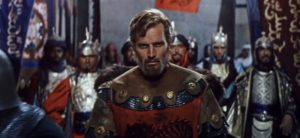
On-screen, Charlton Heston’s de Vivar calls out King Alfonso’s bigotry. He admires the Moors’ culture and requests their council -even going so far as to adopt their respected nickname for him, ‘El Cid’ (or, ‘The Master’). Simultaneously, as El Cid shot, Heston was finding it increasingly impossible not to draw his own sword in the Civil Rights fight. According to Heston, in an August 28th, 1963 taping of Hollywood Roundtable, “Like most Americans, I expressed my support of Civil Rights at cocktail parties.” After successfully cutting his teeth co-negotiating the 1960 Actors Strike, Heston was hungry for a cause. Late that year, as El Cid shot in Spain, Heston’s friend Louis ‘Jolly’ West (then, the Head of the University of Oklahoma’s Department Psychiatry), appeared in the International Herald-Tribune after “inappropriately” protesting in favor of Civil Rights. Seeing this, Heston sent to West asking how he could help. Three days after Heston returned to the States, West replied.
“How would you like to …raise a little hell with me?” Heston recalls West asking in his autobiography, In the Arena. In Spain, Heston (as El Cid) had demanded that respect be shown to his darker-skinned kinsmen for Anthony Mann’s camera. Now, with West, Heston would condemn Oklahoma City’s segregation by marching before crowds and national news cameras. Like El Cid’s King Alfonso, neither MGM or Allied Artists (Ben-Hur and El Cid’s distributors) approved. Each asked Heston to reconsider the possibility of alienating their pictures’ more politically passive audiences. “Come on, guys,” Heston is said to have replied. “El Cid isn’t going to be in theaters for another six months. Ben-Hur’s been playing since 1959; everyone’s seen it already. Are you telling me people won’t go back for a second look because I picket a couple of restaurants?”
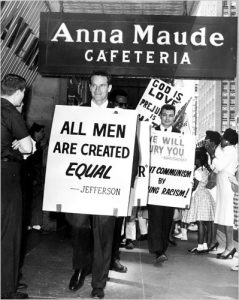
Despite Heston’s demonstration, Ben-Hur still ended its run by earning a record-breaking $74.7 million in American ticket sales. El Cid made $30 million. Most importantly: Heston and West’s march passed peacefully, prompting key establishments such as Anne Maude’s Cafeteria, John A. Brown’s Department Store, and Bishop’s Restaurant to, at last, accept African-American clientele. Humbled, Heston would continue to cash in his image to apply publicity towards Civil Rights causes – culminating, in 1963, in his attendance of Martin Luther King Jr’s March on Washington alongside Harry Belafonte, Marlon Brando, Sammy Davis Jr., Burt Lancaster, and Sidney Poitier.
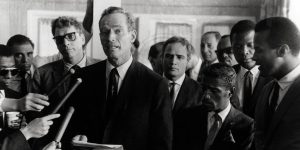
But race relations wasn’t the only death-defying topic that El Cid was tapping into at that time. Heston’s Rodrigo de Vivar is also a conscientious objector. At three different times, El Cid defies his King’s ego-driven orders:
- Within three minutes of El Cid’s introduction, Spanish officials order El Cid to kill two emirs who were captured in battle. Having merely pitched in as he passed by on his way to wed the aristocrat Jimena, El Cid overrides the edict to kill and instructs each emir to swear that they will never attack Spain again before letting them go. For this, King Ferdinand brands El Cid a traitor -temporarily stripping El Cid of his status and Jimena’s heart.
- After Ferdinand dies, Prince Sancho is assassinated. As a result, at Alfonso’s coronation, El Cid forces Alfonso’s hand onto a Bible – instructing him to swear, in public, that he had no hand in Sancho’s murder if he wants to El Cid’s submission. For this edict, El Cid and Jimena are banished.
- Lastly, when Alfonso orders El Cid to return to repel Ben Yusif’s North African army by leading Spain’s soldiers, El Cid resists despite Alfonso’s collateral kidnapping of his wife and daughters. De Vivar, instead, defeats Yusif with forces comprised of fellow objectors and Muslim outcasts.
Because of El Cid’s convictions, Spain is saved, his family is freed, and Alfonso atones for his villainy.
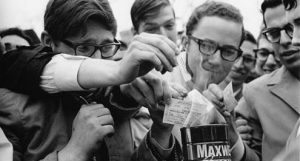
By fate, El Cid’s case for conscientious objection is perfectly, even eerily, timed. On December 11th, 1961 – only three days prior to El Cid’s U.S. premiere – History watched as two evil-adjacent world events occurred. One was the USS Core’s arrival at Ho Chi Minh City’s Saigon Port – an act that officially entered the U.S. into the Vietnam War. Simultaneously, in Israel, Nazi Lt. Col. Adolf Eichmann was declared guilty for faithfully heeding Hitler’s genocidal agenda. Each event bookends individual eras in which conscientious objectivism was required -one case more successful than the last. The USS Core’s actions would eventually lead to conscientious objectivism becoming a household concept. Eichmann’s actions, on the other hand, echo what can occur when too few citizens refuse to be ruled by tyranny.
In two weeks, Donald Trump, like Alfonso IV, will swear publicly upon Scripture that he will run his country righteously. Like El Cid, let us fight to keep his kingdom accountable.
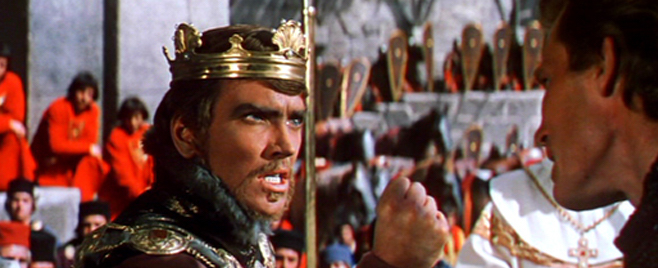





look forward to reading your posts.